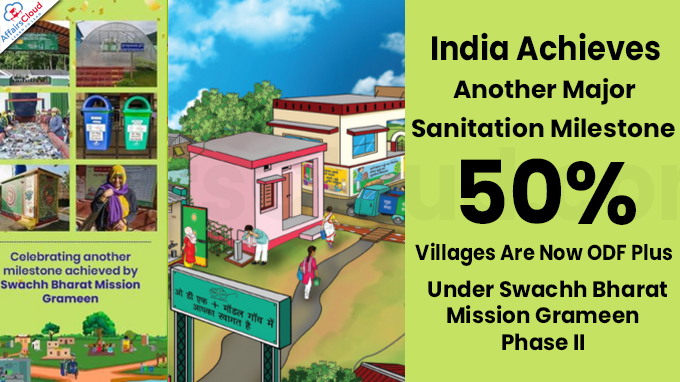 According to the data released by the Ministry of Jal Shakti, as of May 10, 2023, 50% of the total villages in India achieved Open Defecation Free (ODF) Plus status under Phase II of the Swachh Bharat Mission – Gramin (SBM-G).
According to the data released by the Ministry of Jal Shakti, as of May 10, 2023, 50% of the total villages in India achieved Open Defecation Free (ODF) Plus status under Phase II of the Swachh Bharat Mission – Gramin (SBM-G).
- An ODF Plus village is one that has implemented solid or liquid waste management systems in addition to maintaining its ODF designation.
- So far more than 2.96 lakh villages have declared themselves ODF Plus, which is a significant step towards achieving the SBM-G phase II goals by 2024-25.
Top Performing States/UTs:
i.The top performing states in terms of percentage of ODF Plus villages are as follows:
- Among big states – Telangana (100%), Karnataka (99.5%), Tamil Nadu (97.8%) & Uttar Pradesh (95.2%)
- Among small states – Goa (95.3%) and Sikkim (69.2%)
- Among UTs – Andaman & Nicobar Islands, Dadra Nagar Haveli & Daman Diu and Lakshadweep have 100% ODF Plus Model villages.
Background:
a.SBM-G:
i.The Prime Minister(PM) of India Narendra Modi launched the SBM on 2nd October 2014 by modifying the erstwhile Nirmal Bharat Abhiyan (NBA), as a community-led and people-oriented program aimed at universalizing safe sanitation.
- 2023 marks 9 years of the Swachh Bharat Mission.
ii.Under the mission, all villages, Gram Panchayats, Districts, States and Union Territories (UTs) in India declared themselves “ODF” by 2 October 2019, the 150th birth anniversary of Mahatma Gandhi, by constructing over 100 million toilets in rural India.
b.SBM-G Phase II:
i.Further Phase II of the SBM-G was launched in February 2020 with a focus on the sustainability of ODF status and Solid and Liquid Waste Management (SLWM) in rural India and achieving ODF Plus Status.
ii.Phase II of the SBM-G is working towards ensuring that no one is left behind and everyone uses a toilet and it is scheduled to be implemented from 2020-21 to 2024-25 in a mission mode.
iii.Components: The major components of the Phase-II of SBM (G) are Sustaining ODF-Status (ODF-S), Solid (Bio-degradable) Waste Management, Plastic Waste Management (PWM), Liquid Waste Management (LWM), Faecal Sludge Management (FSM), GOBARdhan (Galvanising Organic Bio-Agro Resources- dhan), Information Education and Communication/Behavior Change Communication (IEC/BCC) and Capacity Building.
Fund Allocation:
i.The Union Government has allocated a total of Rs 83,938 crore to SBM-G between 2014-15 and 2021-22, the allocation for the year 2023-24 is Rs 52,137 Crore.
ii.In addition to the SBM(G) funds the allocation of 15th Finance Commission funds for sanitation also have been utilized to build sanitation assets, promote behaviour change, and implement SLWM systems.
Progress in SBM-G Phase II:
a.ODF Plus Villages:
i.Out of the 2,96,928 ODF Plus villages, 56,285 villages are ODF Plus Model villages, 2,08,613 villages are ODF Plus Aspiring villages with arrangements for Solid Waste Management / LWM, and 32,030 villages are ODF Plus Rising villages with arrangements for SLWM.
ii.So far, 1,65,048 villages have arrangements for Solid waste management, 2,39,063 villages have arrangements for LWM, 4,57,060 villages have minimal stagnant water and 4,67,384 villages have minimal litter.
What is ODF Plus Model Village?
It is the village which is sustaining its ODF status and has arrangements for SLWM, observes visual cleanliness, i.e., minimal litter, minimal stagnant wastewater, no plastic waste dump in public places, and displays ODF Plus Information, Education & Communication (IEC) messages.
b.Progress in Plastic Waste Management:
i.831 PWM Units and 1,19,449 waste collection & segregation sheds have been set up so far.
ii.As per the guidelines issued by the Ministry of Road Transport & Highways, the plastic is cleaned, shredded, bailed and transported for use in road construction and also as a fuel in cement factories etc.
iii.More than 1 lakh Gram Panchayats have passed a resolution for a ban on Single Use Plastic (SUP).
c.Bio-degradable waste management:
i.GOBARdhan is an initiative to support biodegradable waste recovery, conversion of waste into resources and creation of a clean & green village.
ii.So far 3,47,094 Community compost pits have been constructed and 683 Functional Bio-Gas/CBG Plants set up across 206 districts.
d.Grey water management:
i.It is the management of the wastewater generated from everyday household chores- cleaning, cooking, bathing etc, in villages that do not have drainage systems.
ii.A special campaign Sujlam was undertaken and approximately 2.2 million (22 lakh) soak pits (community & household pits) were made to manage grey water.
iii.Now, Sujalam 3.0 has been launched for holistic and convergent Greywater Management.
Recent Related News:
On 25th April 2023, during a programme organised on the 53rd Foundation Day of Housing and Urban Development Corporation Limited (HUDCO), the HUDCO Awards of 2022-2023 were announced in New Delhi, Delhi.
The Swachh Bharat Mission (Urban) Uttar Pradesh has been awarded the HUDCO Award (2022-2023) for Best Practices to Improve the Living Environment 2022-23 category for Sanitation.
About Ministry of Jal Shakti:
Union Minister – Gajendra Singh Shekhawat (Constituency – Jodhpur, Rajasthan)
Minister of State (MoS) – Prahlad Singh Patel ; Bishweswar Tudu




